Charlotte Pearce Cornish’s Premier Advisory Group has just won the contract to support free school applications. She explains how the group supplanted her old employer the New Schools Network, and how they will do things differently
At the end of March, New Schools Network lost the government’s lucrative contract to support free school applications. It was unexpected, to say the least.
Since being set up by Rachel Wolf, the policy supremo who co-authored the Conservative Party’s 2019 election manifesto, the charity had won the cash to support would-be free school founders for 12 years running.
Displacing the well-connected charity for the two-year, £1.5 million contract is one of Wolf’s very first hires at NSN back in the heady days of 2011: Charlotte Pearce Cornish, with services firm Premier Advisory Group, where she’s now a director. She thinks she was the seventh person employed at NSN, as a fresh-faced graduate aged 21.
“The free schools policy was the big sexy thing going on in education. It was really, really exciting,” she smiles. “There was a heck of a lot of interest from people not necessarily involved in education – the random man or woman on the street.”
She saw some quirky free school applications as an adviser. On the phone to one group of hopefuls, she asked to see their curriculum plan, only to be told “it was in the post”.
“A couple of days later, a big poster tube arrived addressed to me. They had done the most beautiful curriculum watercolour map,” she smiles again. “I thought, ‘There’s no way I’m going to get that past DfE!’. But it was stunning.”
Applicants of this sort struggled to convince the DfE they could be trusted with public money, she said.
On the other end of the spectrum were groups with highly professional articulations of their visions.
“One of the most exciting ones, and now a massive success story, was Reach Feltham,” continues Pearce Cornish, referring to the free school in Hounslow co-founded by Ed Vainker and Rebecca Cramer. “Right from then, I thought, ‘These guys are going to be superstars.’”
In the charity, Pearce Cornish was among superstars, at least in the political sense. After Wolf left, her second boss was Natalie Evans, who became a Tory peer.
Directors of a supposedly independent and politically impartial charity being prominent Conservative party figures always drew the ire of critics. Mark Lehain, now an adviser to education secretary Nadhim Zahawi, and Nick Timothy, former Downing Street chief who is now a non-executive director at the Department for Education, both later led the organisation. Was Pearce Cornish political?
“So, I think I’m not a Tory by political affiliation – it wasn’t some sort of slavish devotion to most of Tory policy. I remember the media represented NSN as a Tory quango, but it didn’t feel like that internally.
“Those people who were Tory aligned were very broad church.” She adds that Wolf was “an amazing boss” and she “could not have felt more trusted”.
But Pearce Cornish kept a critical eye on what was going on around her. There were two contradictory “strands of thinking in DfE”, she explains.
“One was school autonomy and parental choice, and free schools were in that bucket, and I’m strongly aligned with that. And then on the other hand, and the stuff that used to get into the headlines, was the quite prescriptive views around the curriculum, such as ‘teach history in this very specific way’. They felt slightly in tension with each other.”

Alongside this, Pearce Cornish saw that some potentially worthy applicants (like the watercolour group with their poster) were not getting through. “A big chunk of why I ended up leaving NSN was I felt there were groups like that, where if you supported them differently, they could go a lot further.”
So she became a freelance consultant for three years, writing (rather than just supporting) between six and nine free school applications per wave (rather than case-managing 50 applications per wave, as she had at NSN). At the same time, she returned to her alma mater, Cambridge University, and did a philosophy masters in autonomy in young people. Why the interest in autonomy?
“I think in part it was listening to my parents,” Pearce Cornish replies. She comes from a long line of educators, with teachers at least as far back as her great-great grandfather. Both her parents were headteachers at SEMH schools.
The “needs of children and communities” were often discussed at home, she says. Pearce Cornish loved her education, attending a village primary school and then Barton Court grammar school in Kent.
But autonomy also comes with risks, she notes. A case in point is an academy trust Pearce Cornish helped get set up. Lord James O’Shaughnessy (a former David Cameron aide) employed her in 2016 to project manage the opening of eight schools for his new trust, Floreat Education Academies. The trust folded in 2019, sometime after she left, having just two schools.
“That’s a really good example of the key risks that exist in the free schools programme,” she adds. Everything from demographic populations changing, to procuring hard-to-find sites on time and to budget, can quickly threaten new schools, she explains.
“If there’s a rare species of newt […] or Roman artefacts were found, that can throw your programme off course,” she adds. (Parkfield School in Bournemouth, for instance, was delayed after a colony of bats was discovered on the site.)

But now her company has won the contract to keep the free schools movement alive. According to Pearce Cornish, Premier Advisory Group will share the DfE funding with partners (essentially subcontractors) to help with delivery: including AMR Consult for capital and sites, Kinetic Marketing for marketing, Stone King law firm for legal, and also MLG Education Services.
The company had tried on one previous occasion to win the contract. Now that they’ve been successful, four staff members have transferred over from NSN, bringing the total staff team to 32.
So how did they beat NSN this time round?
“I hope what we were able to bring to the table was really looking at the free school programme within the broader context of the policy environment in the sector,” she says.
This seems to mean that Premier Advisory Group placed an emphasis on looking at the wider growth strategy of free schools and their role within trusts.
Under managing director Tom Legge (an advertising man turned school services consultant), Premier Advisory Group has specialised in strategy and growth, with services to free schools, early years and the justice system all on its books. Legge himself is a trustee at a MAT (Learning Today, Leading Tomorrow) and formerly a trustee at another (Bellevue Place Education Trust).
“Almost everyone in a trust now is thinking about growth planning, particularly in light of the white paper,” continues Pearce Cornish. “As much as I love free schools, they aren’t about exceptionalism for us, they are about how trusts serve the community.”

It’s a different tone to that struck by Sophie Harrison-Byrne, NSN’s director. In February she warned an all-MAT sector “would be the death of one of the key drivers of innovation” – standalone free schools.
In response, Pearce Cornish points out the DfE still hasn’t released the “how to apply” guidance for free schools, so the details are not yet clear. The white paper outlaws new standalone academies, but includes a pledge to “consider” bids for high-quality standalone free schools.
“I would say very few of those groups like Reach Feltham and School 21 came in thinking, we’ll just run one school for ever and ever,” she continues.
“I think innovation is absolutely possible within MATs, and MATs do innovative things all the time. SATs are not the only place innovation can happen.”
Perhaps the innovative newcomers to the free schools market will be councils, I comment. They are set to get powers to found academy trusts – what about free schools?
“That’s a fascinating question, and I would love to see the answer,” replies Pearce Cornish, eyebrows raised.
Meanwhile, she admits there are fewer phone calls from the “random man or woman on the street” to open free schools than in 2011. But when her company got the contract, they still got “ten calls from people wanting to talk about a new school”.
The big challenge now is awareness, partly because free schools are much less controversial, with fewer “Guardian columns” about them than in the past.
“The programme doesn’t have the profile it used to,” says Pearce Cornish. It’s why, she explains, she and the team are in Yorkshire talking to trusts about where a free school “could fit into strategic planning” and proving it’s “not a scary process”.
“I think there will always be the next generation coming through with amazing ideas,” she smiles. “I don’t think there’s a time limit on that.”














Your thoughts